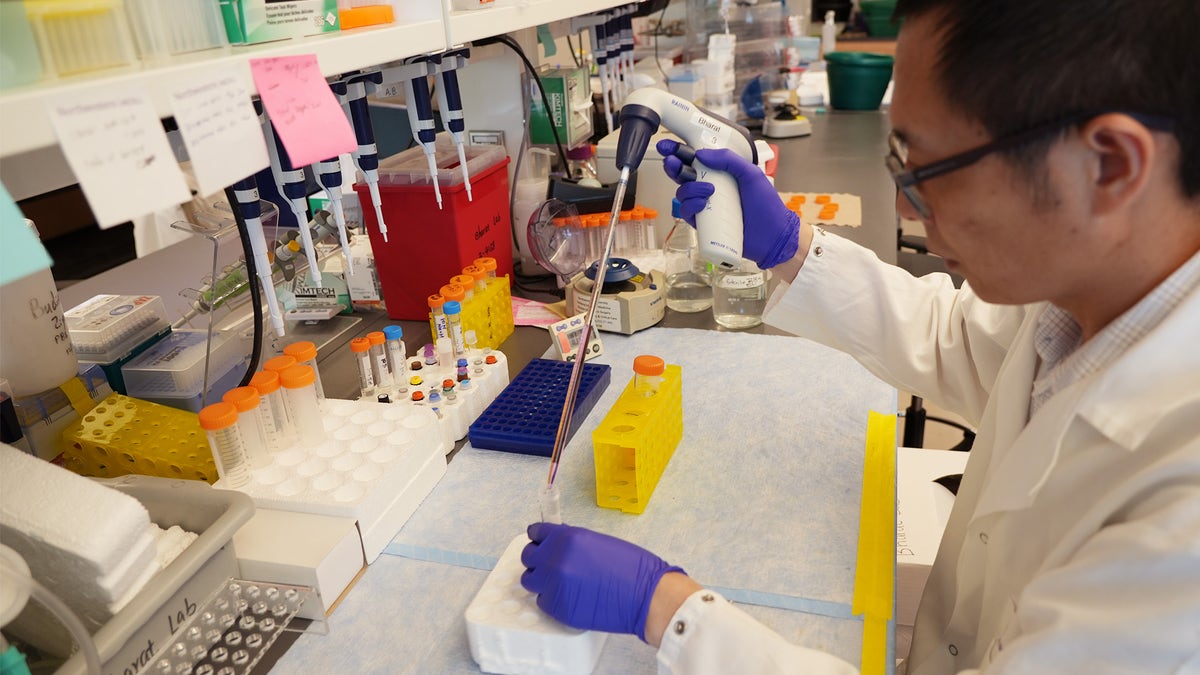Subscribe to Fox News to access this content.
Your account also gives you special access to select articles and other premium content for free.
By entering your email and continuing, you agree to Fox News’ content. Terms of Use and Privacy PolicyHere is our Financial Incentive Notice.
Please enter a valid email address.
COVID-19 can cause a variety of health problems, including: flu symptomsMedical experts say it causes respiratory problems and even organ damage, but new research suggests the virus may have surprising effects on cancer.
A study published last Friday in the Journal of Clinical Investigation found that COVID-19 infection is associated with cancer regression, which could be the basis for new cancer treatments in the future.
that SARS-CoV-2 virus — which causes the coronavirus — is made up of ribonucleic acid (RNA), a molecule found in all living cells.
Flu and coronavirus vaccines: Should you get both at the same time?
In the study, RNA was found to “trigger the development of specific types of immune cells. anticancer properties“According to a press release from Northwestern Medicine Canning Thoracic Institute in Chicago.
Photo of Dr. Ankit Bharat’s research team at the Northwestern Medicine Laboratory. (Northwestern Medicine)
The newly generated immune cells were able to migrate to blood vessels and tumors. This is something normal immune cells cannot do.
“These killer cells swarm into the tumor and begin attacking the cancer cells directly, helping to shrink the tumor,” said lead author Ankit Bharat, MD, Department of Cardiothoracic Surgery at Northwestern University School of Medicine.
Cleveland Clinic’s Breast Cancer Vaccine Update: ‘A New Era’
Researchers found that this effect was activated by severe COVID-19, especially melanoma, lung cancer, breast cancer And colon cancer.
“This discovery opens a new avenue for cancer treatment,” Bharat said in the release.
“It offers hope that using this approach we can benefit patients with advanced cancer who have not responded to other treatments.”
Initial findings require more research
This discovery has so far only been seen in animal models.
“We are in the early stages, but it has the potential to transform cancer treatment,” Bharat said in a press release.
“Our next steps will include clinical trials to determine whether these findings can be used safely and effectively to help cancer patients,” the study authors said. (iStock)
“Our next step is clinical trials “It’s about making sure we can use these discoveries safely and effectively to help cancer patients.”
“The putative mechanism is that a major inflammatory event, such as an infection, can tip the scales toward activating the immune system against cancer.”
Dr. Marc Siegel, clinical professor at NYU Langone Health and senior medical analyst for Fox News, pointed out that although this is “not a cure for cancer and has only been found in mice,” the study has some significance.
“It reminds us Viruses cause inflammation Siegel, who was not involved in the study, told Fox News Digital:
CLICK HERE TO GET THE FOX NEWS APP
Dr. Jacob Glanville, CEO of San Francisco biotechnology company Centivax, was also not involved in the study but said he was not surprised by the findings.
“There is a known history of the phenomenon of ‘spontaneous regression’ following infection with high fever in a variety of diseases,” he told Fox News Digital. “It goes back to when doctors identified the cancer.”

According to a press release, the study found that RNA “triggers the development of a unique type of immune cell with anti-cancer properties.” (Northwestern Medicine)
“Normally, the immune system can tell that something is wrong with the body. cancerous tissueBut cancer causes a variety of mutations to prevent the immune system from attacking the cancer,” Glanville continued.
Click here to subscribe to our health newsletter.
“The putative mechanism is that a major inflammatory event, such as an infection, can tip the scales toward activating the immune system against cancer.”

The Northwestern Madison building is pictured in Chicago, Illinois. (Northwestern Medicine)
According to research COVID-19 Vaccine He added that although it can have the same effect, it is more likely that an actual infection causes it because the immune system is more “angry” from the infection.
Nonetheless, Glanville added, “the rate at which this happens is probably not yet high enough to justify it as a reliable treatment.”
For more health articles, visit: www.foxnews.com/health
The study was funded by the National Institutes of Health and the Canning Thoracic Institute.
Fox News Digital has reached out to researchers for further comment.

What are the long-term implications of recent cancer treatment findings for patient outcomes?
What are the potential implications of these findings for cancer treatments in the future?
How might the COVID-19 pandemic have affected cancer research and treatment?
What are some of the challenges that need to be addressed before this approach can be safely applied to humans?
How does the immune system respond differently to actual infections versus vaccines when it comes to combating cancer?
Are there any other viruses or inflammatory events that have been shown to have similar effects on cancer regression?
What is the next step for researchers to further explore and validate these findings?

